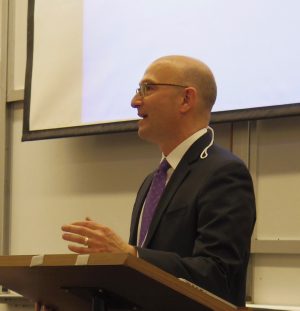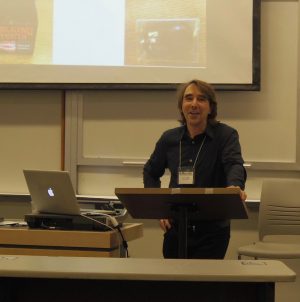May 2017 Newsletter
- The President’s Message
- Panels of Interest to Victorianists at Congress 2017 in Toronto
1. The President’s Message
As many of you will know, this is an important jubilee year – not only for Canada as it celebrates its 150th birthday, but also for the VSAO as we mark our 50th anniversary! I’m happy to report that while the Association might now be considered decidedly middle-aged, it is in excellent health, and as vibrant as ever.
We have much to celebrate. In November 2016, WNED/WBFO, the public television station in Buffalo, contacted the VSAO to invite our participation in the premiere showing of the new BBC series, Victoria, in Canada. Our Association Secretary, Alison Halsall, served as the expert discussant at the event on 10 December 2016. (In case you’re wondering why an invitation didn’t reach you – the event sold out instantly!)
Our annual conference took place at York University’s Glendon College on Saturday 29 April. Exploring our conference theme, New Intimacies: Changing Interactions in the Victorian World, the three speakers for our morning panel examined different modes of communication in Victorian culture. Elissa Gurman analyzed the shifting balance between passive consent and active, willed choice in Eliot’s The Mill on the Floss; in her presentation, Maggie Tulliver’s expressions of romantic desire take these contrasting forms, even as the narrative emphasizes the need for rational, explicitly communicated consent. Turning to the representation of communication technologies in detective fiction, Lyndsay Day compared the gendered use of machines for communication, like typewriters and telegraphs, to the “information flow” of clues through which detectives like Sherlock Holmes and Loveday Brooke solved crimes. Lin Young addressed the means by which returning spirits were thought to communicate proofs of their existence through material possessions, domestic objects, and props; visualized at times through photography, they also often signalled their presence through markers of their former identities, like hats and boots.
Our first keynote lecture, “Affordances of Victorian Literary Forms and Media Formats: Towards a Sociology of Literary Historical Audiotexts,” by Jason Camlot (Concordia University), revealed how changes in audio technologies determined the forms of communication that were possible during the late nineteenth and early twentieth centuries. From Edison’s attempts to design a phonogram that would conform to the postal service’s size and shape constraints, to the way the limited run time of recordings meant that they generally featured character sketches and compressed scenes rather than whole narratives, Camlot revealed the ways in which form and format mattered to the Victorians.
 In the second keynote, “From Angry Father to Loving Friend: The Changing Face of God in Modern Britain, 1840s to 1930s,” Seth Koven (Rutgers University), traced a historical transformation in the deeply personal theologies of Victorians, as they recast the religion of their childhoods, one centred on a paternal, often punishing God. Reimagining Christianity with the figure of a friend, Jesus, at its centre, radicals like Edward Carpenter, Muriel Lester, and Agnes Maude Royden identified the social and sexual capaciousness – even the queer potential – of the category of friend as well in their daily interactions.
In the second keynote, “From Angry Father to Loving Friend: The Changing Face of God in Modern Britain, 1840s to 1930s,” Seth Koven (Rutgers University), traced a historical transformation in the deeply personal theologies of Victorians, as they recast the religion of their childhoods, one centred on a paternal, often punishing God. Reimagining Christianity with the figure of a friend, Jesus, at its centre, radicals like Edward Carpenter, Muriel Lester, and Agnes Maude Royden identified the social and sexual capaciousness – even the queer potential – of the category of friend as well in their daily interactions.
The conference was also the occasion for our annual business meeting, at which we said farewell – and a heartfelt thank you – to Margo Beggs, an outgoing executive member-at-large, and Alison Syme, VSAO president from 2013 to 15 and executive member ex officio since 2015. We also welcomed two new members to the executive, Emily Rothwell, a doctoral student in the Institute for Comparative Studies in Literature, Art and Culture at Carleton University, and Lin Young, a doctoral student in English at Queen’s University.
Our celebration of the VSAO’s fiftieth anniversary continues into May, with two events at ACCUTE (the Association of Canadian College and University Teachers of English, at the Congress of the Humanities and Social Sciences), which will be held at Ryerson University in downtown Toronto this year. Our first event is a sponsored panel, “Many Happy Returns: The Anniversary in Victorian Britain,” at 10:30am on Saturday 27 May, and the second is “The Future of Interdisciplinary Victorian Studies,” a roundtable with eight current and past members of the VSAO executive in discussion, at 1:45pm on Monday 29 May; details appear below. Please join us for conversation and for a slice of birthday cake on the 29th!
I also draw your attention to the next section of this newsletter, a list of panels and lectures whose focus is Victorian studies. You’ll recognize among the panellist’s names faculty and graduate student members of the VSAO. If you have plans to be in Toronto between the 27th and 31st, please think about attending some of these events – it’ll be a great opportunity to support our colleagues and to see other members of the VSAO.
This brings me to the end of my message – and to the end of my term as president. It’s been an honour and pleasure to serve the Association in this capacity, especially as it heads into its 50th year, and I look forward to remaining on the executive for the next two years. For those of you who weren’t able to join us on April 29th, I’m pleased to report that we unanimously elected a new president, Suzanne Bailey, Professor of English and Chair of Gender & Women’s Studies at Trent University. Suzanne’s research and teaching interests encompass Victorian poetry, nineteenth-century science, and women’s writing. With her commitment to interdisciplinary studies and her gracious leadership style, she brings a great deal to the Association, and we’re fortunate to have her as our president.
Tina Young Choi
2. Panels of Interest to Victorianists at Congress 2017 in Toronto
Saturday 27 May 2017
10:30am-noon: ACCUTE
Joint Panel with the VSAO
Many Happy Returns: The Anniversary in Victorian Britain
Victoria 104
Chair: Suzanne Bailey (Trent)
Jo Devereux (Western), “‘Dear and Precious Objects’: Queen Victoria’s Birthday Table at Osborne, 1849-61”
Alison Hedley (Ryerson), “‘A popular and interesting pictorial method’: Multimodal Storytelling in the ILN’s Jubilee and Coronation Numbers”
Rachelle Stinson (York), “The Commemorative Conundrum: Crashing the Party in Victorian Oxford Fiction”
Sunday 28 May 2017
8:45am-10:15am: Canadian Society for the History and Philosophy of Science
Victorian Science
Ted Rogers School of Management 2-119
Chair: James Hanley (University of Winnipeg)
Nastasha Sartore (Toronto), “Ethnology, Progress, and Working-Class Improvement in Victorian England: The Bethnal Green Museum, 1872-7”
Gregory A. Good (American Institute of Physics), “John Herschel’s Landscapes and Geology: The Cape Colony in the 1830s”
Jiwon Byun (UBC), “Thomas H. Huxley’s Epistemological Project behind Agnosticism”
8:45am-10:15am: ACCUTE
Joint Panel I with the North American Victorian Studies Association (NAVSA)
Victorian Form I
Victoria 304
Organizer and Chair: Tina Choi (York)
Ann Gagné (George Brown), “Let us think that we build for ever”: Ruskin’s Everlasting Form
Kirstin Hainer (Toronto), “Neverending Stories: Trollope, Eliot, and the Dissolution of Novel Form”
Elizabeth Howard (Minnesota), “Fancy Bred and Dead: G.M. Hopkins’s Adaptations in Form as a Means of Performance”
10:30am-noon: ACCUTE
Joint Panel II with the North American Victorian Studies Association (NAVSA) Victorian Form II
Victoria 304
Organizer and Chair: Tina Choi (York)
Rachel Ablow (SUNY Buffalo), “Dombey’s Form of Life”
Angela Du (Toronto), “The Affordances of Singularity in Tess of the D’Urbervilles”
Fiona Coll (SUNY Oswego), “‘Please Subscribe Quickly’: Procedural Logic and Narrative Form in Samuel Butler’s Erewhon”
1:45-3:15pm: ACCUTE
19th-Century Influences
Victoria 304
Chair: Alice den Otter (Lakehead)
Stephanie Edwards (McMaster), “Intergenerational Exchange and Literary Legacy in Mary Shelley’s ‘Introduction’ to The Last Man”
Rose Sneyd (Dalhousie), “George Eliot, Giacomo Leopardi, National Literature and Literary Cosmopolitanism”
Kimberly Rodda (Toronto), “Rethinking Eliot’s Narration in Middlemarch through James’ The Portrait of a Lady”
D.M.R. Bentley (Western), “From ‘Rapture’ to ‘Revolt’: T.S. Eliot and Dante Gabriel Rossetti’s ‘The Blessed Damozel”
Monday 29 May
1:45-3:15pm: ACCUTE
Roundtable with the Victorian Studies Association of Ontario (VSAO)
The Future of Interdisciplinary Victorian Studies
Victoria 504 >> note new location <<
Organizer and Chair: Tina Choi (York)
Suzanne Bailey (Trent U, English)
Leslie Howsam (Windsor, History)
Lorraine Janzen Kooistra (Ryerson, English)
David Latham (York, English)
Barbara Leckie (Carleton, English)
Hao Li (U Toronto, English)
Matthew Rowlinson (Western, English)
Alison Syme (U Toronto, Art History)
1:45-3:!5pm: ACCUTE
Joint Panel with the International Gothic Association (IGA)
Gothic Objects
Victoria 505
Organizer and Chair: Karen Macfarlane (Mount St. Vincent)
Susan Hroncek (Laurier), “A Museum of the Dead: Spectral Objects in MP Shiel’s The Purple Cloud”
Thomas Stuart (Western), “Vanishing Point: The Hound of the Baskervilles and the Gothic Clue”
Lin Young (Queen’s), “The Chemical Spectre: Rethinking 19th Century Materiality through Ghost Fiction and Spiritualist Discourse”
5:00-6:30pm: ACCUTE
Christianity and Literature Study Group (CLSG)
Romantic and Victorian Sensibilities
Victoria 508
Chair: Michael di Santo (Algoma)
Natasha Duquette (Tyndale), “Science and Theology in Ann Radcliffe’s Romance of the Forest”
David Bentley (Western), “Sensuous Regions of the Spirit: Dante Gabriel Rossetti’s Religious Illustrations in Moxon’s Tennyson”
Dominick Grace (Western), “Death Without God in Anthony Trollope’s The Fixed Period”
Tuesday 30 May
8:45-10:15am: ACCUTE
Nineteenth-century Space-Times
Student Learning Centre 449
Organizer and Chair: Amanda Paxton (Trent)
Elizabeth TeVault (George Washington U), “The Ghost in the Machine: Temporalities and Technologies in the Victorian Supernatural Fiction of Amelia B. Edwards”
Pat Beesley” (Newcastle), “Hinton’s Hyperspace and Female Subjectivity”
Chloe Flower (NYU), “‘Interior Design’: Doll’s House and Tenement in Octavia Hill’s Essays”
Wednesday 31 May 2017
10:30am-noon: Canadian Society for Digital Humanities
Futures of Biographical Encoding
Ted Rogers School of Management 1-109
Chair: Lorraine Janzen Kooistra
with Constance Crompton, Michelle Schwartz, Jason Boyd, Alison Hedley
3:00-4:30pm: Canadian Association for the Study of Book Culture
Keynote Address
LIB-Library 405 – Open Space
Dr. Leslie Howsam (University of Windsor)
Textbooks for the Victorian Empire: Bringing Book History and Digital Humanities to the Challenges of Colonial Historiography


